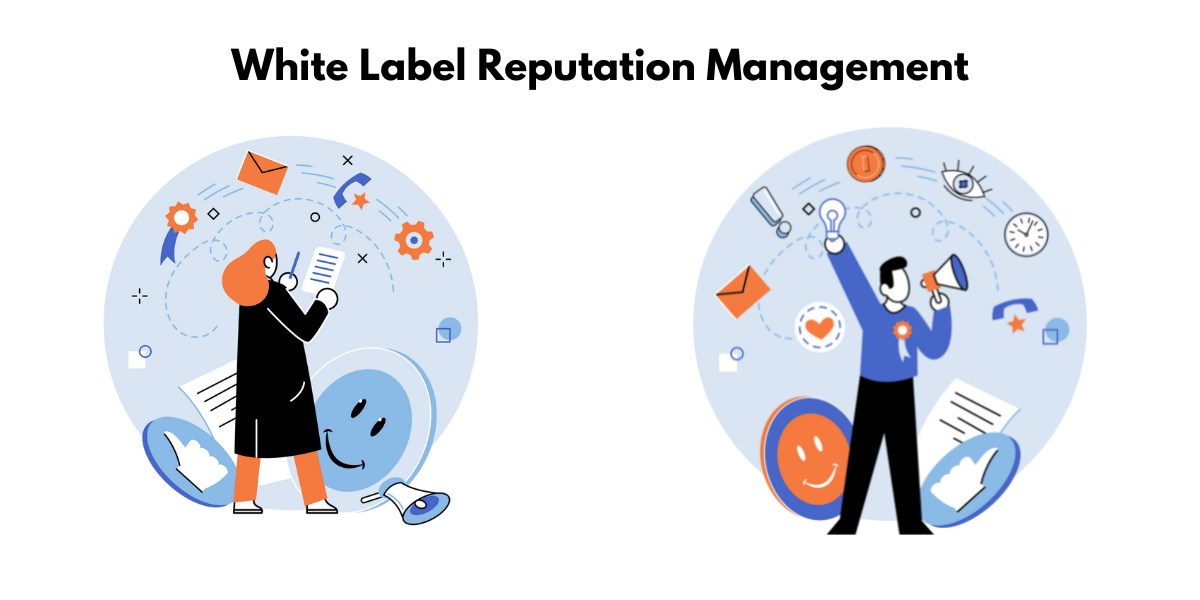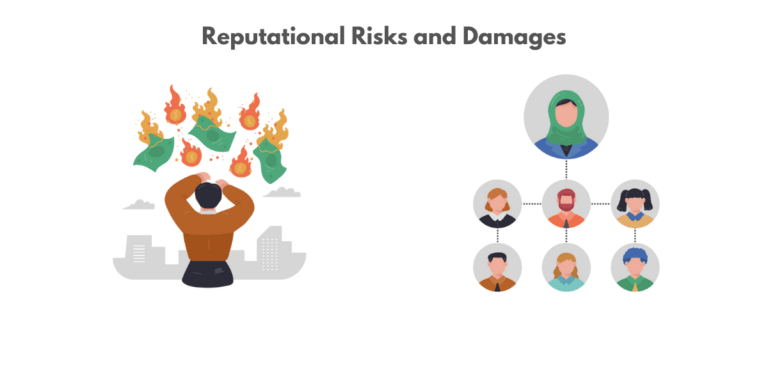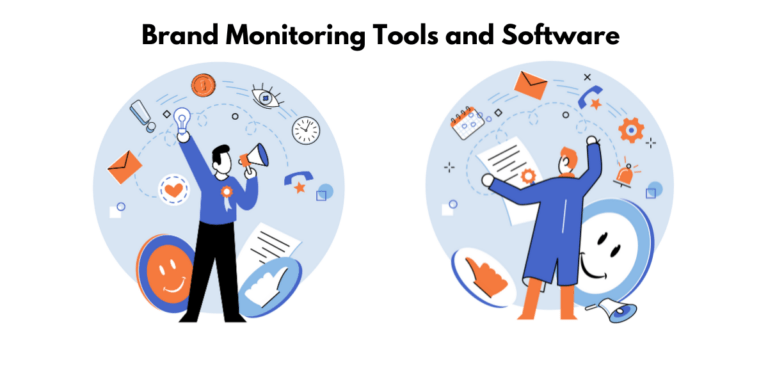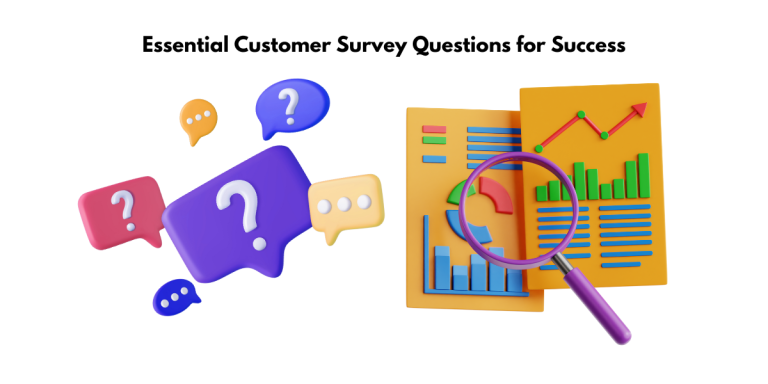What is white label reputation management?
White label reputation management is a service provided by digital marketing agencies and reputation management firms that helps to shape consumer perception of a company, organization, and brand.
It involves a combination of the following tactics and strategies:
- reputation measurement and marketing
- search engine optimization
- media and public relations
- online review management
- social listening and social media and reviews marketing
- customer experience management
- employer branding
White label reputation management companies allow businesses to outsource their reputation management to a third-party provider, who will create content, build backlinks, monitor any online client mentions, and respond promptly.
The provider rebrands the services and resells them to clients at retail prices, allowing them to associate the product with the reseller.
The right white label reputation management solution should also enable organizations to easily generate reviews for their clients, which can be in the form of third-party reviews on platforms such as:
- Yelp Business
- Google My Business
- Facebook Business Manager
As well as first-party reviews collected through a landing page or email campaign and displayed on the brands’ websites to help improve search performance.

What is white label marketing?
White label marketing is strategic digital agencies, and other third-party firms use to help their clients manage their online reputation and brand.
The objective is to ensure that their online reputation remains consistent with their offline business.
White labeling allows agencies to provide complex services without hiring their human resources team and maintaining high payrolls.
White label reputation management services involve the wholesale purchase of services from a white label marketing agency which are then resold to their clients.
The services include reputation measurement and marketing, search engine optimization, media and public relations, online review management software, social listening, customer experience management, and employer branding.
White label reputation management is a cost-effective way to outsource reputation management efforts and focus on a reputation management agency’s expertise.
It also provides a new source of income with minimal effort.
It allows businesses to increase their revenue by offering new services and building a reputation for helping their clients do the same.
What is white label reputation management software?
White label reputation management software is a powerful tool that enables businesses to monitor online reviews and mentions of their brand and promptly respond to positive and negative feedback.
It is “re-brandable” software, meaning that developers send the customer review software to other businesses, who customize it to their needs and resell it as their own.
Digital marketing agencies and reputation management firms typically provide white label reputation management services.
This allows them to offer a consolidated solution and boost their client’s online reputation, improving brand credibility and trust.
The software also provides insights through AI and machine learning, helping customers track conversations across the web and compare their performance to their competition.
What are the 3 categories of tactics for reputation management?
Reputation management is an important part of any business’s success, as it consists of strategies and tactics to influence a company’s public image and its brands.
White-label reputation management tools make the process easier and more efficient, allowing companies to concentrate on their areas of expertise and gain meaningful, actionable insights about their online reputation.
These tools help businesses consolidate the solutions to boost their clients’ online reputation and improve brand credibility and trust.
Let’s discuss the three categories of tactics for reputation management – reputation measurement and reputation marketing, search engine optimization, and media and public relations.

Earned content
Earned content is created naturally by customers, influencers, and other third parties who have had a positive experience with a brand. It can be in reviews, blog posts, tweets, and more.
Earned content is highly valuable as it helps to strengthen a brand’s reputation by providing an authentic and trustworthy signal of quality.
Reputation management is the practice of influencing a brand’s public image by shaping the information about it available online.
Earned content is an important part of this process as it provides an authentic signal of trustworthiness and quality, helping to boost a brand’s reputation.
With the right reputation management services, companies can regain control of their online identity by responding to reviews, monitoring social media, and utilizing SEO and customer experience management.
In addition to helping shape online perceptions, earned content can also be used to create a more positive online presence and personal connection with customers.
By engaging with customers and responding to their reviews and experiences, companies can create a more two-way dialogue to help build their reputation further.
Paid content
Paid content can play an important role in reputation management.
It can help to counteract negative reviews, promote a company’s positive attributes, or push down negative search engine results to ensure that the most visible content about a company is positive.
Paid content also gives companies more control over the messages they are sending out and how they are perceived.
Paid content can strategically target specific audiences, ensuring the right people are reached with the right message.
Additionally, paid content can boost SEO efforts, increasing a website’s visibility and helping to improve a company’s online reputation.
Owned content
A company or brand creates owned content or individual they have direct control over.
This content includes owned websites, blogs, and social media channels like Facebook, Twitter, and Instagram.
Owned content is used to manage and monitor a company’s online reputation.
It allows stakeholders to establish an online presence, engage with their audience, and build trust and credibility.
Owned content can also respond to and address negative reviews, comments, and feedback while creating positive content that will boost a company’s reputation.
Owned content is important to reputation management because it allows companies to control how their brand is presented to the public and maintain a positive perception.
10 facts about white label reputation management
We will provide you with 10 facts about white label reputation management that you should know.
These include how it works, how to find the right white label service, what to look for when choosing a provider, how it can help digital agencies, and how it can help generate reviews.
By understanding these facts, you can decide whether white label reputation management is the right solution for you and your clients.
1. A white label reputation management platform is a tool that allows users to manage their online reputation more effectively
White label reputation management is a valuable tool for software and services businesses.
It allows them to provide clients with a comprehensive solution for managing their reputation while saving time and resources.
White-label reputation management platforms enable users to easily generate reviews from third-party platforms like Yelp Business and Google My Business and collect and display first-party reviews.
This can help strengthen SEO signals and local SEO factors and increase visibility in local search results.
The generated reviews can also be used as social proof to fuel clients’ marketing efforts.
Additionally, white label reputation management platforms help businesses stand out from competing agencies, reduce customer churn, and extend customer lifetime value.
By leveraging the right white-label reputation management tool, organizations can provide their clients with insights to improve their online reputation, enhance customer experiences, and drive more revenue.
In conclusion, white label reputation management software is invaluable for businesses that provide software and services.
It helps organizations save time and resources but also helps strengthen their client’s online presence and generate more revenue.

2. A white label reputation management platform allows businesses to control and monitor their online reputation more efficiently
A white label reputation management platform helps businesses control and monitor their online reputation by providing them with various tools and services.
These include generating reviews for their clients, monitoring online reviews and mentions, creating listings, and getting feedback for their brand.
Additionally, the platform offers the ability to create content, build backlinks, and respond promptly to online reviews or mentions.
This helps businesses build their brand, increase their visibility in local search results, and strengthen their SEO signals.
Overall, white label reputation management helps businesses maintain a positive online presence and protect their bottom line.
3. A white label reputation management platform enables businesses to track and analyze their online reputation data more effectively
A white label reputation management platform helps businesses track and analyze their online reputation data by providing features such as:
- third-party review generation
- competitor analysis
- customer experience analytics
- employer brand monitoring
Through these features, businesses can collect data, monitor online reviews, get feedback for their brand, and identify important insights into their online reputation.
This helps them to easily track and understand how they are being perceived on the web, enabling them to make informed decisions and improve their online reputation.
4. A white label reputation management platform allows businesses to respond quickly and effectively to negative reviews
Here’s a simple instruction on how white label reputation management platforms allow businesses to respond quickly and effectively to negative reviews:
Step 1: Understand the need to manage and monitor your online reputation
A white-label reputation management platform provides businesses with the tools they need to monitor online reviews and respond to negative and positive posts most effectively.
It allows them to generate reviews on popular platforms such as Yelp Business, Google My Business, and Facebook Business Manager and collect and display first-party reviews through a landing page or email campaign.
Step 2: Sign up for a white label reputation management platform
Businesses can access a comprehensive solution for managing and monitoring their online reputation by partnering with a white label reputation management platform.
The platform also provides customizable branding and domain solutions, allowing businesses to offer their clients professional reputation management services while building their brand and increasing their revenue stream.
Step 3: Receive alerts when new reviews are posted
The white label reputation management platform will alert businesses when new reviews are posted, allowing them to take action quickly and respond effectively to feedback.
This helps businesses keep track of the reviews about their brand and take the necessary steps to protect and enhance their reputation.
Step 4: Respond to negative reviews
When businesses receive alerts about negative reviews, they should take their time to read the review and respond professionally and respectfully.
Appropriate responses to negative reviews should acknowledge the reviewer’s concerns and address any issues they have raised.
Businesses should also offer to resolve the issue promptly and satisfactorily if possible.
Step 5: Monitor the reviews to ensure customer satisfaction
Finally, businesses should use the white label reputation management platform to monitor reviews over time and maintain customer satisfaction.
This will help businesses ensure that customers are happy and that any negative reviews are addressed quickly and efficiently.

5. A white label reputation management platform allows businesses to increase their positive reviews and brand loyalty
A white label reputation management platform can help businesses increase their positive reviews and brand loyalty by providing comprehensive tools to monitor, manage, and enhance their online presence.
This includes the ability to easily generate reviews for their clients, which helps to increase social proof, fuel their marketing efforts, strengthen SEO signals and local SEO factors, and improve their visibility in local search results.
Furthermore, the platform also offers the ability to collect and display first-party reviews, which can help to build up their reputation and improve their search performance.
Additionally, by including white label reputation management software as part of their services, businesses can offer their clients a low friction, quick value add service that can help to build up their reputation and ultimately increase their brand loyalty.
6. A white label reputation management platform allows businesses to expand their reach and increase their visibility
White label reputation management platforms can give businesses a powerful tool to expand their reach and increase their visibility. They can create content, build backlinks, monitor online mentions of a company, and respond promptly.
These platforms can also help to generate third-party reviews on platforms such as Yelp Business, Google My Business, and Facebook Business Manager.
Additionally, businesses can collect and display first-party reviews via a landing page or email campaign, which can be displayed on their website through a review widget.
These features contribute to a positive online reputation, increased social proof, improved SEO signals and local SEO factors, and greater visibility in local search results.
For digital marketing agencies, white label reputation management can help them deliver greater value to their clients, stand out from competing agencies, reduce customer churn, and extend customer lifetime value.
It can also be used as a low friction, quick value add service, part of a larger full-service package, or as an add-on for existing clients, providing another revenue stream for businesses.

7. A white label reputation management platform allows businesses to take control of their online reputation and make it work for them
A white label reputation management platform helps businesses by providing them with the tools to easily generate reviews which can increase their social proof, boost their SEO signals, and improve visibility in local search results.
Additionally, businesses can monitor any online mentions of their brand, respond to reviews promptly, and collect first-party reviews through a landing page or email campaign.
This helps them build and maintain their online reputation and gives them insights to improve customer experiences and drive more revenue.
Furthermore, businesses can outsource their reputation management efforts to a third party, allowing them to focus on their expertise while saving time and resources.
White-label reputation management can help businesses stand out, reduce customer churn, and extend customer lifetime value.
8. A white label reputation management platform allows businesses to effectively manage their business listings, directories, and online reviews
A white label reputation management platform can help businesses manage their business listings, directories, and online reviews by creating listings, monitoring online reviews, and providing feedback through a dashboard.
This can help with the following:
- social proof and fuel marketing efforts
- strengthen SEO signals and local SEO factors
- increase visibility in local search results
- generate third-party reviews on platforms such as Yelp Business, Google My Business, and Facebook Business Manager
Additionally, white label reputation management solutions can help businesses collect and display first-party reviews on their websites, which can be used to improve their search performance using website review widgets.
By using a white label reputation management platform, businesses can focus on their expertise and save time overall, increasing their revenue by adding new services.
9. A white label reputation management platform allows businesses to combine their SEO and CRO efforts into one cohesive strategy
A white label reputation management platform can help with SEO and CRO by allowing organizations to generate reviews posted on third-party platforms such as Yelp Business, Google My Business, and Facebook Business Manager.
These reviews help to increase social proof, fuel marketing efforts, strengthen SEO signals and local SEO factors, and contribute to greater visibility in local search results.
Additionally, white label reputation management solutions offer the ability to collect and display first-party reviews, which can then be displayed on the brands’ websites as a review widget.
This helps improve search performance and provides businesses with valuable feedback from customers that can be used to improve the customer experience and optimize the conversion rate.
10. A white label reputation management platform allows businesses to save time and money with a fully automated platform
White label reputation management solutions can help businesses save time and money by enabling them to easily generate client reviews, increasing their social proof, and helping to strengthen their SEO signals and local SEO factors.
This will help to contribute to greater visibility in local search results, driving more traffic and sales.
Additionally, businesses can resell the white label reputation management platform to other agencies under their brand, providing additional revenue streams.
White label reputation management can also help businesses identify areas where they can add value and quickly address negative reviews.
Overall, using a white label reputation management platform can help businesses save time and money.
- Uncovering Fake Google Reviews: The Real Story Behind 5-Star Ratings - December 4, 2024
- How to Skyrocket Online Reviews: Expert Strategy Insights in Getting Reviews - August 23, 2024
- Discover Five Unique Strategies to Elevate Your Small Business Growth - April 30, 2024







